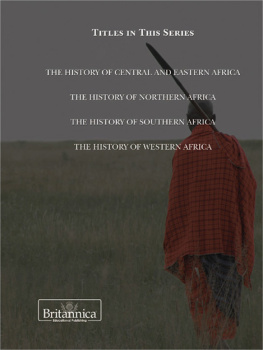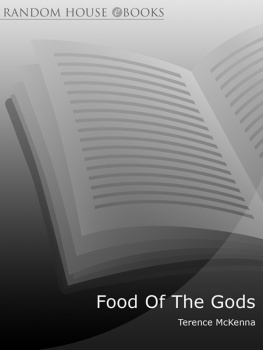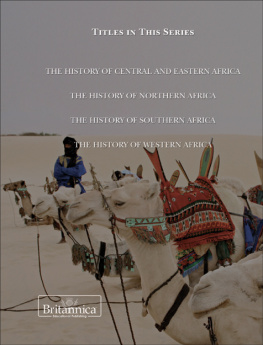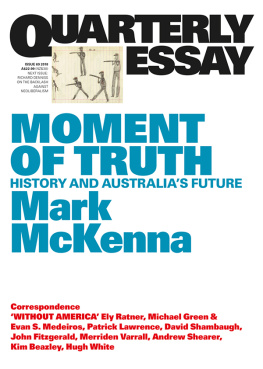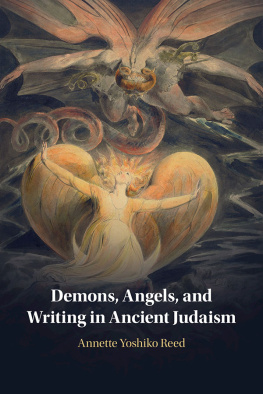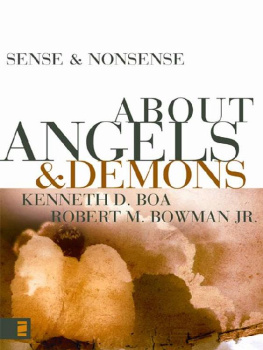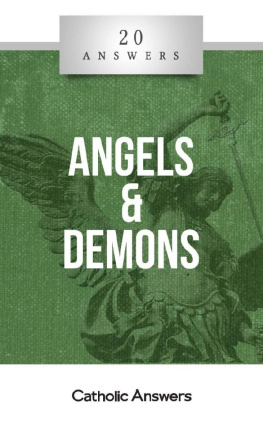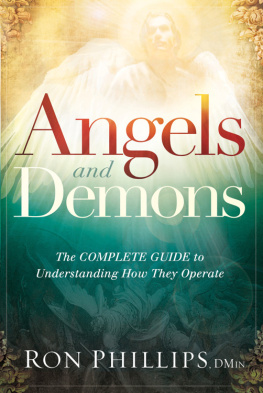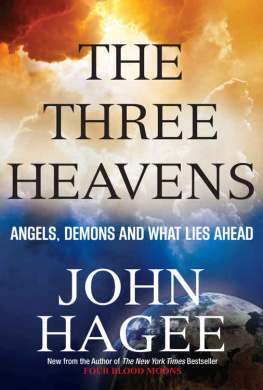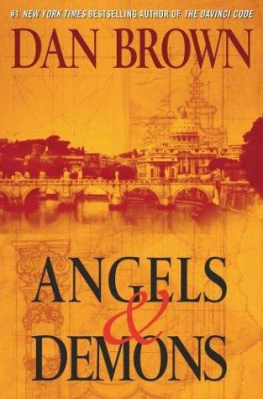McKenna - Angels and Demons: A Radical Anthology of Political Lives
Here you can read online McKenna - Angels and Demons: A Radical Anthology of Political Lives full text of the book (entire story) in english for free. Download pdf and epub, get meaning, cover and reviews about this ebook. year: 2019, publisher: John Hunt (NBN), genre: Art. Description of the work, (preface) as well as reviews are available. Best literature library LitArk.com created for fans of good reading and offers a wide selection of genres:
Romance novel
Science fiction
Adventure
Detective
Science
History
Home and family
Prose
Art
Politics
Computer
Non-fiction
Religion
Business
Children
Humor
Choose a favorite category and find really read worthwhile books. Enjoy immersion in the world of imagination, feel the emotions of the characters or learn something new for yourself, make an fascinating discovery.

Angels and Demons: A Radical Anthology of Political Lives: summary, description and annotation
We offer to read an annotation, description, summary or preface (depends on what the author of the book "Angels and Demons: A Radical Anthology of Political Lives" wrote himself). If you haven't found the necessary information about the book — write in the comments, we will try to find it.
Angels and Demons: A Radical Anthology of Political Lives — read online for free the complete book (whole text) full work
Below is the text of the book, divided by pages. System saving the place of the last page read, allows you to conveniently read the book "Angels and Demons: A Radical Anthology of Political Lives" online for free, without having to search again every time where you left off. Put a bookmark, and you can go to the page where you finished reading at any time.
Font size:
Interval:
Bookmark:

Also by Tony McKenna
The Dying Light (a novel)
ISBN-10: 1910705888
The Dictator, the Revolution, the Machine: A Political Account of Joseph Stalin
ISBN-10: 1845198263
Art, Literature and Culture from a Marxist Perspective
ISBN-10: 1137526602

First published by Zero Books, 2019
Zero Books is an imprint of John Hunt Publishing Ltd., No. 3 East St., Alresford,
Hampshire SO24 9EE, UK
www.johnhuntpublishing.com
www.zero-books.net
For distributor details and how to order please visit the Ordering section on our website.
Text copyright: Tony McKenna 2018
ISBN: 978 1 78904 020 3
978 1 78904 021 0 (ebook)
Library of Congress Control Number: 2018933760
All rights reserved. Except for brief quotations in critical articles or reviews, no part of this book may be reproduced in any manner without prior written permission from the publishers.
The rights of Tony McKenna as author have been asserted in accordance with the Copyright, Designs and Patents Act 1988.
A CIP catalogue record for this book is available from the British Library.
Design: Stuart Davies
Printed and bound by CPI Group (UK) Ltd, Croydon, CR0 4YY, UK US: Printed and bound by Edwards Brothers Malloy 15200 NBN Way #B, Blue Ridge Summit, PA 17214, USA
We operate a distinctive and ethical publishing philosophy in all areas of our business, from our global network of authors to production and worldwide distribution.
I am grateful to the publishers of the following works for permission to reuse copyrighted material from them as the basis for the chapters indicated:
Hugo Chavez and the PSUV in Light of the Historical Process in Venezuela. Critique: Journal of Socialist Theory, February 2009 (Taylor & Francis, Oxford).
Christopher Hitchens: Pathology of an Imperialist Ideologue. Socialism and Democracy, March 2014 (Taylor & Francis, Pennsylvania).
For Mara del Carmen
When I was 19 I read The History of the Russian Revolution by Leon Trotsky for the first time. It is a remarkable book for many reasons. It depicts a monumental event in all its sweep and grandeur, it describes with great literary verve and pathos the historical conditions which boiled over into the revolutionary eruption, it outlines the revolutionary process in clinical and precise terms yet also perfectly captures the atmosphere of flesh-and-blood struggle and heady freedom such an event entails. And it all flows from the pen of one of Octobers central political actors. But there was one chapter which was particularly resonant to me and would have a marked effect on my own development as a journalist and historian. Chapter four of the first volume of Trotskys magnum opus offers a vivid and intimate portrayal of the Tsar and the Tsarina and the atmosphere of the royal court which had now entered into its end of days as the revolution drew close. I would go as far as to say this chapter offers up one of the greatest literary and psychological accounts of the human personality which has ever been penned; it illuminates fully the souls of the Tsar and the Tsarina by way of a writing which is beautiful, profound and scathing in terms of its bitter irony.
It was, however, very different from the conventional psychological approach of the time, the psychoanalysis of Freud. Freudian psychoanalysis offered up a hermetically sealed individuality whose internal laws and patterns operate in an immanent and pristine space, retaining a high level of abstraction and independence from the external world and any historical context. According to Freud, every child goes through several stages of personality development oral, anal, phallic etc. and it is the ability to navigate these stages successfully which can determine whether the personality of the fully formed adult is aberrant, neurotic, healthy and so on. Freud would argue, for
Expanding on Freud, Eric Fromm of the Frankfurt School argued that the rational bureaucrat the sociological type of capitalist which Max Weber had described with all its orderliness, efficiency and routine was something which had much in common with Freuds anally retentive personality, only Fromm would re-classify such a personality in terms of a hoarding orientation. So we are privy to a precise methodological operation; a fully formed and generic individuality is called into being, and this becomes the central impetus, the prime mover, of the historical process. Moving from psychology to historiography, a similar approach was popularised in the nineteenth century by Thomas Carlyle, both a philosopher and a historian, who argued that the history of the world is but the biography of great men.
Trotskys account of the Romanovs provides a tonic to this, the abstract individualism which has become the default template for biography writing in the modern epoch. Trotsky certainly does not deny the importance of the individual, of the great man or woman, but he begins from the notion that the key to describing a true and authentic individuality is found in the historical conditions in which it achieves fruition. In the case of the Tsar and the Tsarina, Trotsky describes the twilight of a whole historical epoch. A decaying empire spanning a vast territory was overseen by a decadent state; a feudal absolutism whose power was enshrined by an aura of medieval religiosity and appeared more and more as some gargantuan and monstrous relic in the context of modernity. In the context of the mass migrations which were taking place from the country to the town, the rapidly developing urban populations, the rise of the new industries, and the demand for radical new political forms and expressions. The contradiction between the modern and the archaic was increasingly volatile, increasingly tested; from the Decembrist revolt in the mid-1820s, reformist and revolutionary movements had been gaining steam, and the rise of the new super industries and the vast concentrations of workers in great industrial hubs meant that Russian forms of Marxism and anarcho-syndicalism were fused by steam and fire into a particularly potent product.
But, argued Trotsky, to that historic flood which was rolling its billows each one closer to the gates of his palace, the last Romanov opposed only a dumb indifference. It seemed as though between his consciousness and his epoch there stood some transparent but absolutely impenetrable medium. The great revolutionary observes that such apathy, such utter spiritual inertia, lies at the core of a historically doomed personality:
[He] would interest himself generally in the little rubbish of the days doings, while thunders roared over him and lightnings flashed his ability to control himself in the most extraordinary circumstances, cannot be explained by a mere external training; its essence was an inner indifference, a poverty of spiritual forces, a weakness of the impulses of the will. That mask of indifference which was called breeding in certain circles, was a natural part of Nicholas at birth.
As the revolutionary forces rumbled ever closer to the gate, the royal court seemed to go into lockdown; the hangers on, the bribed officials, the stodges and the lackeys proliferated a rotten, mouldering network of corruption hung around the state machine like a noose: Special official purveyors arose forming a powerful Upper Chamber attached to the monarch. There was no lack of bigoted old women with the title of countess, nor of functionaries weary of doing nothing, nor of financiers who had entire ministries in their hire. Indeed, observes Trotsky, even the Tsars sadism was characterised by a certain malignant introversion:
Font size:
Interval:
Bookmark:
Similar books «Angels and Demons: A Radical Anthology of Political Lives»
Look at similar books to Angels and Demons: A Radical Anthology of Political Lives. We have selected literature similar in name and meaning in the hope of providing readers with more options to find new, interesting, not yet read works.
Discussion, reviews of the book Angels and Demons: A Radical Anthology of Political Lives and just readers' own opinions. Leave your comments, write what you think about the work, its meaning or the main characters. Specify what exactly you liked and what you didn't like, and why you think so.



